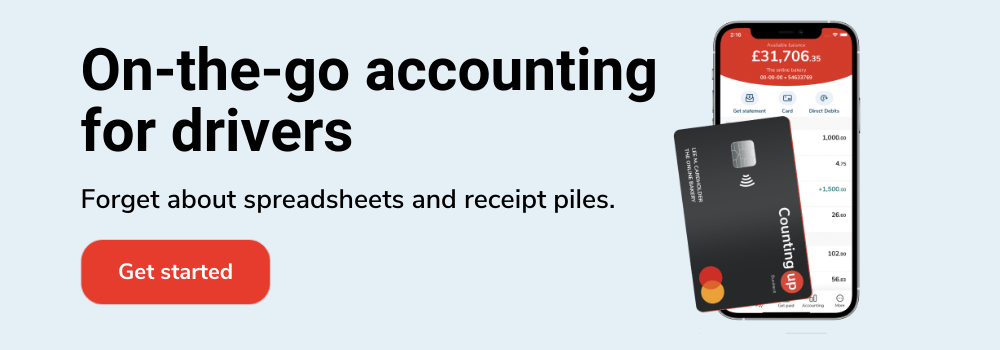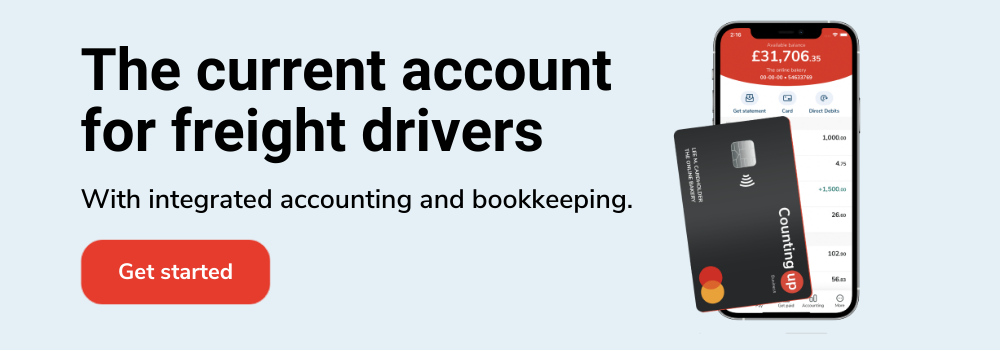Accounting Guide: transport industry
Table of Contents
Freight and haulage company owners face several challenges every day — and accounting is a big one.
Accounting is everything from your company’s financial history and health to performance. But you don’t need to be a magician with your finances to run a successful business. Understanding the basics of accounting will keep you on the path to success.
In this guide we cover:
- Why accounting is important in the transportation industry
- Common accounting and finance-related challenges
- Accounting essentials for transport businesses
- Best practices in accounting in the transportation industry
No matter the size of your fleet, it’s vital to understand and apply the basic accounting concepts to help your business thrive.
Why is accounting important in the transportation industry?
You’re no stranger to the importance of haulage and freight companies in the global supply chain. Moving things up and down the country (or across countries) is a big job.
That’s why it’s essential to stay on top of your bookkeeping. With accurate information under your belt, you can put together forecasts and plan for each aspect of your business. This gives you an accurate picture of your business’ financial health in the short and long term.
Each industry has its own specialised accounting differences. In haulage and transportation, accounting typically involves vast quantities of invoices, accounts receivable, and freight bills. This makes proactive and thorough bookkeeping essential.
Common accounting and finance-related challenges
Many people in the transportation industry choose to manage their accounting in spreadsheets. While these do the job, they are prone to errors – the good news is technology can help.
Countingup’s easy-to-use app makes it easy to digitise your accounting. With automated invoices, receipt capture tools, tax estimations, and more, you no longer have to sort through paper receipts or worry about missing invoices.

COVID-19 has sped up the move towards digital and online experiences — for both consumers and businesses. The challenge for haulage and freight companies is an increased demand for delivered goods within shorter timeframes than ever before. More orders and shipments mean more paperwork to keep track of.
Essential accounting tips for transport businesses
Accounting might not be your passion, but keeping your accounts organised is the path toward financial growth. Here are a few accounting essentials:
1) Plan tax regularly
Tax planning isn’t just a once-a-year chore. Completing tax returns and business accounts close to tax deadlines can hurt your small company more than you may think. If you make a mistake, HMRC could hit you with a large tax bill later.
To prepare, embed bookkeeping into your year-round business practices. This will save you hours, lessen the risk of mistakes and keep your accounts in good shape.
Planning has the added benefit of helping you identify areas where you could make some savings. Without the proper tax preparation, there’s a chance your business could cost itself unnecessarily.
Read next: 4 essential tax tips for business owners
2) Create a cash-flow statement and forecast
Haulage and transport businesses face challenges and opportunities that you can’t always foresee. Poor weather causes delays and disruptions, suppliers face difficulties, and existing customers may decide to double their business with you.
A cash flow statement gives you a clear picture of your company’s health as it shows how your business makes and spends money. Cash flow statements show the actual amount of cash your company has on hand, and project future cash flow.
To have a glimpse of the future, you can create a cash flow forecast. This shows you how you expect cash to flow in and out of your company for a specific period. With this information, you can analyse these forecasted scenarios to see what impact they might have on your company’s financial health.
3) Leverage working capital management
Your business needs regular income to make routine payments, cover costs and buy necessities to keep going. The money your business has available to pay for these day-to-day expenses are called capital.
Working capital management helps you make use of your capital and helps you spend it on the right things. This tool helps you boost profitability by letting you:
- Streamline operations
- Control inventories
- Manage accounts receivable (money owed to you)
- Manage accounts payable (money you owe)
In other words, it helps you cover your financial obligations and boosts your company’s growth.
4) Optimise your asset management
Assets are the items you own that you could sell off for cash, such as equipment, property, or investments. Asset management allows you to keep track of assets: where they’re located, how they’re used and if they’ve been changed. You could use asset management to see how your company van is performing and if you need to repair or upgrade it.
These days, there’s software designed for asset management that could help you measure fuel use, mileage and vehicle condition. You can then use this information to estimate daily, weekly or even monthly costs of using your van. Managing assets regularly can help you see if your assets lose value over time.
Accounting best practices for transport and haulage companies
Understanding best practices in business accounting is a great way to get ahead. It also provides an opportunity to identify risks and weaknesses to determine any areas that need improvement.
Stick to International Financial Reporting Standards (IFRS)
IFRS gives guidance on how companies should prepare and disclose financial statements that are comparable with similar companies internationally.
It’s important for transportation businesses to adhere to these, as many take part in cross-border transactions. IFRS brings transparency by improving the quality of financial information, allowing you to make informed decisions and scope new opportunities.
IFRS has specific rules these statements:
- Financial Position: This is your balance sheet. IFRS influences how you report the different components of your balance sheet, like how you list assets or liabilities.
- Comprehensive Income: This reports changes to owners’ equity that originate from traditional income and non-owner sources
- Changes in Equity (or statement of retained earnings): This shows your company’s change in earnings or profit for a specific period.
- Cash Flows: IFRS has rules for how you report your company’s financial transactions in a period, separating cash flow into Operations, Investing, and Financing.
You can find more information on the IFRS website. If you find it too complicated, an accountant can help clear things up for you.
Pay attention to local legislation
While it’s crucial to comply with IFRS, local regulations are just as important. Because of your operations as a freight or transport business, you may complete work across several countries. So, you should know the legislation for each area to avoid any compliance or legal issues.
Keep your personal and business finances separate
When running a small business, the amount you pay yourself affects the tax you pay. On top of this, it’s important to consider the different effects of salary, dividends and other benefits.
Opening up a separate business current account will have many benefits. Keeping your finances organised could help with transparency, but is also very helpful around the tax season. Separating your transportation business finances can prevent you from overspending and keep you compliant with HMRC rules and regulations.
When you open a Countingup business current account, you also get free built-in accounting software that helps streamline your financial admin. Features like invoice automation, a receipt capture tool, and tax estimation, help you stay on top of your finances easily.

Budget for tax and remember tax deadlines
Record fixed expenses (rent, loan payments, wages), variable expenses (utilities, supplies), and one-off costs during unexpected situations. Don’t forget to factor tax into your business budget to be prepared when payments are due.
Budgeting allows you to plan, prioritise finances, and reduce outgoings to increase income or profitability. Forward planning can help you identify cost-saving opportunities and create a safety net should an economic storm ever appear.
As a small business owner, there are a few dates throughout the year to put into your business calendar. Visit the UK Government website to prepare for the year ahead.
Keep all your freight invoices and receipts
Goods and freight are some of the major costs you’ll incur. For that reason, it’s important to keep records of all bills and invoices.
Post-shipment or after delivery, keep detailed records of all your activities and operations. Remember: export regulations require you to maintain thorough documentation for at least five years after a transaction and delivery is complete. And keeping records gives you clear visibility of your business operations.
For most haulage companies, five years’ worth of records includes:
- Digital copies of invoices
- Packing lists
- Bills of lading
- Country of origin certificates
- The money you owe and that’s owed to you (accounts payable and receivable)
- Purchase orders
- Sales records
- Compliance screening records
- Shipments emails
All records, invoices, and financial data need to be secure and easily accessible.
Use the most up-to-date accounting software for your transport company
One of the best ways to improve your accounting is to keep your systems up to date. Outdated and inefficient accounting software will slow down your operations and could keep you from meeting your evolving expectations.
In the modern business climate, companies deal with more and more digital data that must be recorded and processed correctly. Inefficient accounting software could fail to record valuable information you need to make informed decisions about your business.
Using accounting software will help you manage the different parts you need to determine your company’s financial health. Benefits of quality accounting software include:
- Time saved on financial admin
- Financial data organised in one place
- Simple and fast data entry processes
- Automated accounting and bookkeeping
- Reduced manual errors
- Invoices can be created and sent in seconds
- In-depth and comprehensive financial reports for better decision making
- Tax estimates so you know exactly how much to put aside
- Live business insights
One less thing to worry about with Countingup
The Countingup business current account has built-in accounting software that automates the time-consuming aspects of bookkeeping and taxes for sole traders, contractors and one-person limited companies. Find out more here.
Receive actionable business tips weekly
By submitting this form, you confirm that you are 16 years of age or over and that you have read and agree to our Privacy Policy. You can unsubscribe at any time.



